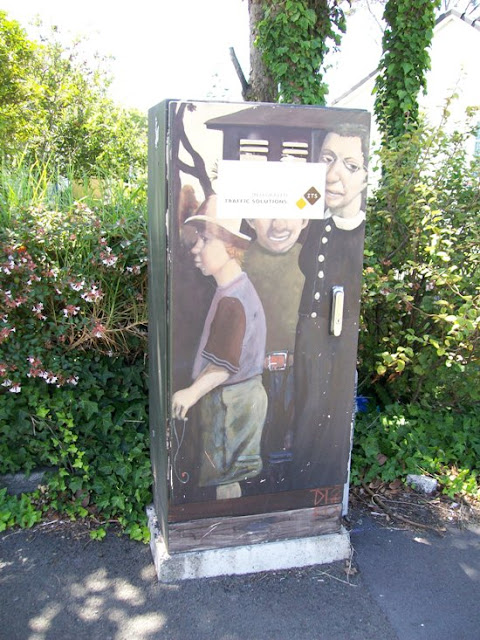Some more graves from the Wesleyan/Anglican section of the cemetery.
The plaque, at the gate to the steps leading down to the cemetery:
City of Auckland
Grafton Bridge
Passersby are reminded that below this bridge reposes the honoured remains of many Pioneer Settlers whose enterprise and endurance through many difficulties and during troublous times laid the foundations upon which the progress and prosperity of this City and Provincial District have been built.
On the other post, the Grafton Bridge 1910 plaque.
Thomas Howard Kirkham, possibly a sawmill foreman, died 27 April 1880, nearly three months after the death of his 8 month old daughter Bertha, also buried here.
This one, shadowed by the bridge, is simple "R D, 1879".
We do have more on Stephen Edward Hughes, however.
Many of our readers will regret to learn of the death of Mr Stephen Hughes, of the well known firm of Hughes and George, solicitors, Auckland, which took place yesterday. The deceased gentleman was born in Rochester, England, in October, 1821, and was consequently in his 66th year. He arrived in Auckland in 1840, but in 1846 returned to England, and was married to his present wife. In 1850 he came back and finally settled in Auckland, and after a short time was appointed clerk to the Provincial Council, which post he held for some years. After that he joined the staff of the Southern Cross newspaper, which he subsequently left to study the law under the late Mr Wm.. Bracey, Mr Edwin Hesketh studying with him in the same office. He was admitted to the bar in 1862, and was joined by Mr George in 1876, forming,the well known firm of Hughes and George. Tha late Mr Hughes was a member of the General Anglican Synod.
Thames Star 31 May 1887
Abel Goldsworthy, formerly of Redruth in Cornwall, just simply dropped dead in Queen Street one day in 1872.
An inquest was held yesterday at the Claricarde Hotel, before T M Philson, Esq., coroner, and a respectable jury, on the body of Abel Goldsworthy, whose sudden death we announced in our yesterday's issue.
The first witness called was Stephen Catran, who, being sworn, deposed : I am a miner, residing at the Thames. I have known the deceased for the last six and a-half years. He was a miner. He was a single man about 33 years of age. By appointment I met deceased on Sunday morning last at about 10.20. We started from the Royal Mail Hotel, and walked up and down Queen-street. I noticed nothing unusual in his appearance. He told me he felt very well, a few minutes after 12 o'clock. We were then at the corner of Queen- and Victoria-streets, speaking of an appointment we had in the afternoon. Deceased suddenly said, "I'm off, Steve." I caught him in my arms as he fell backwards. A crowd soon gathered. A man — who I afterwards learnt was named Shepperd — and who somebody said was a doctor, looked at deceased, and said he was dead. This was about five minutes after he fell. A table was brought, and we laid him upon it. Froth was coming from his mouth. When he took the fit I noticed that his face became very red, and his neck was very much swollen. Mr. Nankervis went for a doctor, who arrived about ten minutes afterwards. He pronounced deceased to be dead. He was then conveyed to his home. He had not been drinking. He had a fit on Saturday. Dr. Sam gave him a prescription he did not get it made up. The deceased has a sister residing at Ballarat. His mother and another sister reside in England. No one bled deceased whilst on the table. He had a deposit receipt for over £300 and a £20 note upon him when he died. The police took charge of them.
H 0 Nankervis deposed to having seen the deceased on the morning previous to his death, when he described to him his feelings when in the fit on Saturday. He aho said he often felt a pain in his left side. He had not been drinking to witness's knowledge.
Dr Hooper deposed to having, at the request of the jury, made a post mortem examination of the body. He was of opinion that death had resulted from disease of the heart.
Dr. Seth Sam deposed to the deceased having met him on Saturday last, and having asked for a prescription, which he gave him. He had since heard that it had not been used. Witness believed death had resulted from heart disease.
The jury returned a verdict in accordance with the medical testimony to the effect that deceased had died from disease of the heart.
Southern Cross 16 April 1872
One nice thing on the headstone are the words: "Erected by his mates, Martin Cateren and Bros."
The stone is so badly weathered, I hadn't a hope of determining who is this.
John and Mary Frances Eales, of 6 Grove Road, Mill End in London, lost their youngest son John, aged just 22.

























































